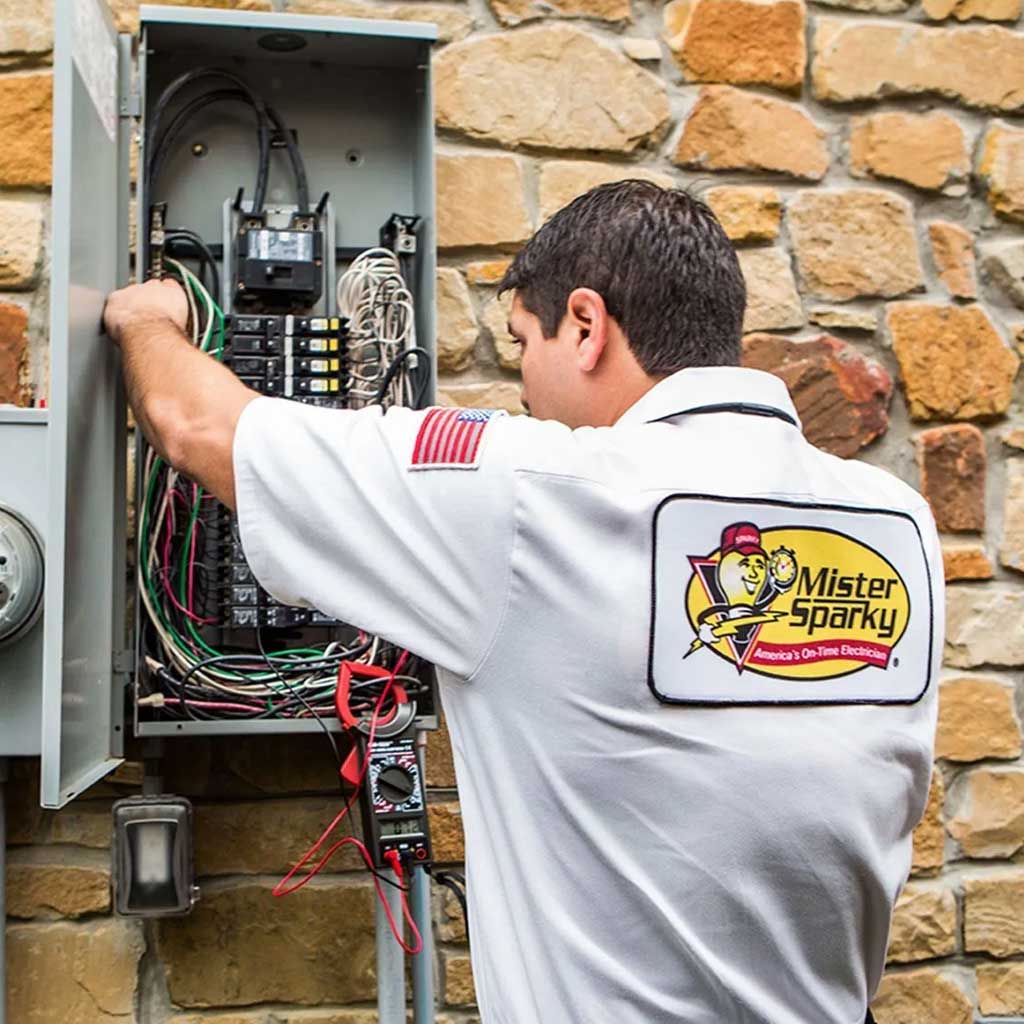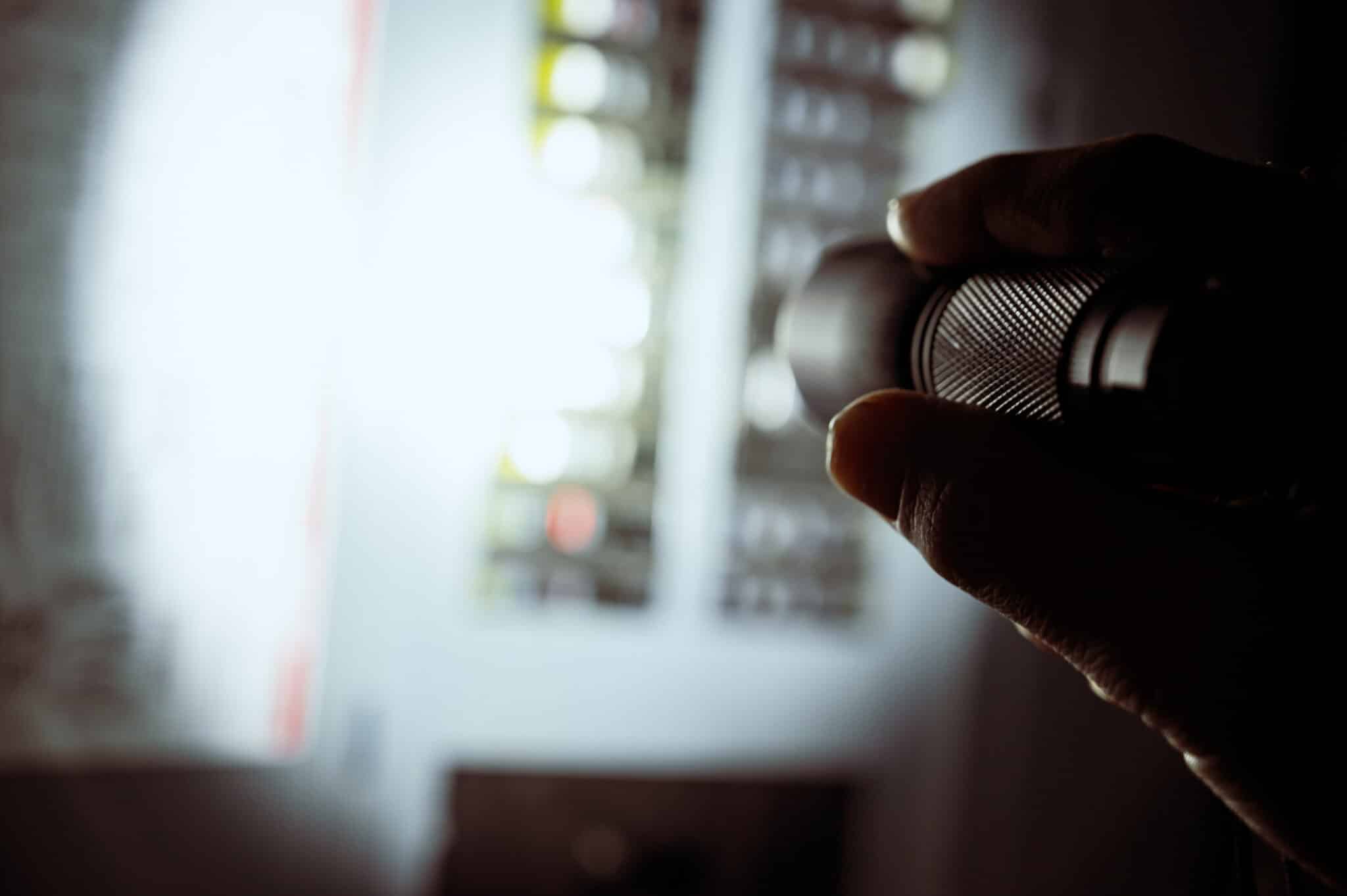A circuit breaker keeps your home safe by cutting power when the electrical current gets too high. This helps prevent overheating and fire hazards. Old circuit breakers may not trip when they should, which can raise the risk of fire and damage appliances. Regular checks and upgrades help keep your electrical system safe and working well.

What Is a Circuit Breaker and How Does It Work?
A circuit breaker is a key part of your home’s electrical safety.
It’s a small but important device that shuts off power when there’s too much electricity flowing through the system.
This helps prevent wires from overheating, which could cause fires or serious damage.
Think of it like a safety switch.
As electricity moves through your home’s wiring, this protective device keeps an eye on the flow.
If it gets too high, like when too many appliances are running on one circuit, it trips and cuts the power in 1/60th of a second to stop overheating and other dangers.
Without a circuit breaker, your home’s electrical system would be at high risk of fires and damage.
These safety mechanisms protect your appliances, wiring, and, most importantly, everyone in your home.
No matter how old or new your house is in Summerville, SC, making sure your breakers work properly is a must for electrical safety.
Signs Your Circuit Breaker Might Be Outdated
If your circuit breaker keeps tripping, that’s not just frustrating, it’s a warning sign.
A constantly shutting-off breaker could mean your electrical panel is overloaded or wearing out.
According to the U.S. Fire Administration, overloaded circuits cause 13% of home electrical fires.
Look for physical damage too.
Scorch marks, discoloration, or a burning smell around your panel aren’t normal.
These signs mean something is overheating, which can turn into a fire hazard if ignored.
Pay attention to how your appliances behave.
Do your lights flicker?
Do outlets stop working randomly?
Are your devices struggling to turn on?
If so, your electrical panel might not be handling your home’s energy needs properly.
Don’t wait until small issues turn into big problems.
Electrical hazards can cause serious damage, or worse.
If you’re in Summerville, SC, call Mister Sparky of Charleston, SC for a professional inspection and possible upgrade.
The Risks of an Outdated Circuit Breaker
If your circuit breaker is old, it’s not just outdated, it’s a hidden danger in your home’s wiring.
As we use more power than ever, older breakers can struggle to handle the load, increasing the risk of serious problems.
The biggest threat? Fire.
If a breaker fails to trip during an overload, wires can overheat, sometimes reaching over 194°F (90°C).
That kind of heat can set insulation and nearby materials on fire, turning a small issue into a disaster.
But fire isn’t the only risk.
A faulty breaker can also lead to electrical shocks.
When it no longer does its job right, outlets and wiring may carry unsafe levels of current, putting you and your family in danger.
Outdated panels can also damage your expensive electronics.
Power surges and unstable electricity can wear out your appliances much faster, leading to costly repairs or replacements.
If your breaker panel is outdated, now’s the time to upgrade.
A modern circuit breaker keeps your home safe, efficient, and protected from electrical hazards you don’t want to risk.
Homeowners in Summerville, SC, should consider an upgrade to ensure their electrical systems meet today’s safety standards.
Common Types of Circuit Breakers in Your Home
Your home’s circuit breaker does more than just cut the power when something goes wrong, it keeps your electrical system safe.
There are different types, each serving a specific purpose.
The most common are standard low-voltage breakers.
These protect your home’s wiring from overloads and short circuits, preventing fires and other electrical hazards.
Then there are magnetic and thermal-magnetic breakers.
Magnetic breakers trip instantly when the current surges too high, while thermal-magnetic ones also respond to slow, steady overloads, offering extra protection.
If you’re looking for something more advanced, smart breakers might be worth considering.
They track your energy use in real time and can help improve energy efficiency.
Knowing what kind of breaker you have, or need, can make a big difference in protecting your home.
Not sure? Mister Sparky, serving Summerville, SC, can check your system and make sure you have the safest option in place.
How an Outdated Circuit Breaker Can Put Your Home at Risk
An old circuit breaker isn’t just annoying, it’s a real safety hazard.
It’s supposed to stop electrical problems, but over time, it can wear out and stop working right.
If it doesn’t trip when it should, you could face electrical fires, shocks, or even damage to your appliances.
One big issue is electrical overload.
Modern homes use way more power than older ones, but many old panels weren’t built for that.
If a breaker gets overloaded, it can overheat, increasing the risk of failure or fire.
Plus, outdated electrical panels don’t have the safety features new ones do, like AFCI (Arc Fault Circuit Interrupter) protection.
These breakers shut off power 100 times faster than standard ones when they detect dangerous electrical arcs, making your home much safer.
If your electrical panel is outdated, it’s time to think about an upgrade.
Ignoring the warning signs puts your home and family at risk.
A professional inspection and replacement in Summerville, SC, can help keep everything safe.
Why Older Homes in Summerville, SC May Be at Risk
If you live in an older home in Summerville, SC, your electrical system might not be keeping up with today’s power needs.
Many homes built before 1975 weren’t designed for the number of appliances and electronics we use now.
Back then, electrical panels were usually rated for just 60-100 amps, but today’s standard is 200 amps.
An outdated electrical system isn’t just inconvenient, it can be dangerous.
An old circuit breaker may fail to trip when overloaded, which can lead to overheating and even electrical fires.
Worn-out wiring and aging electrical components can also cause flickering lights, frequent power outages, or damage to your appliances.
Summerville’s climate can make things worse.
High humidity and salty coastal air can speed up corrosion in your electrical panel, making it less reliable.
If your home is decades old and still has its original breaker system, it’s a good idea to have a professional from Mister Sparky of Charleston, SC check it for safety and performance issues.
Differences Between Modern and Outdated Circuit Breakers
Not all circuit breakers are the same.
Older ones don’t have the safety features that newer models do.
Modern breakers shut off power faster, lowering the risk of electrical fires and shocks.
But many older homes still use outdated panels that weren’t built to handle today’s high-power appliances and electronics.
One big advantage of modern breakers is their ability to stop arc faults.
AFCI (Arc Fault Circuit Interrupter) breakers, now required in many new homes, can detect dangerous electrical arcs and shut off power almost instantly.
Plus, smart breakers let you track electricity use in real-time, helping you save energy.
Some models can even cut your home’s energy use by up to 20%.
Breaker panels usually last 25-40 years, but individual units might need replacement sooner.
Not sure if yours are still safe?
It might be time to call a professional in Summerville, SC.
Learn more about breaker replacement here.
When to Upgrade Your Circuit Breaker Panel
An old circuit breaker panel isn’t just annoying, it’s a safety risk.
If your breaker trips a lot, your lights flicker, or your appliances don’t run well, it might be time for an upgrade.
Older panels can’t always handle today’s power needs, which can lead to overheating and even fire hazards.
Upgrading to a modern panel makes your electrical system more stable.
New panels spread power more evenly, so circuits don’t get overloaded.
This is especially important for older homes in Summerville, SC, where aging electrical systems may not meet today’s safety rules.
Plus, newer panels work with smart home tech, helping you track and save energy.
A panel upgrade isn’t just about safety, it’s a smart move for your home.
Whether you’re adding new appliances or just want a safer home, having Mister Sparky of Charleston, SC check your system is the way to go.
How I Check Circuit Breakers for Safety
When I inspect a circuit breaker, the first thing I do is look for obvious problems, corrosion, scorch marks, or loose connections.
These signs tell me if the system is aging or failing, which can be a fire risk.
But a simple look isn’t enough.
I also run tests to check how well the breakers are working.
One of the best tools for this is thermal imaging.
It helps me spot overheating parts before they cause big problems.
Overheated circuits can fail or even start fires, and studies show thermal imaging can prevent up to 70% of electrical failures.
If I find issues, I may suggest upgrading the panel or replacing faulty breakers.
This is especially important for older homes in Summerville, SC, where outdated systems struggle to handle today’s power needs.
A full inspection makes sure your home’s electrical system is safe, efficient, and ready to handle your energy use.
If you think your circuit breaker panel might be outdated, now’s the time to schedule a checkup with Mister Sparky of Charleston, SC.
How Circuit Breakers Help Prevent Electrical Fires
Your circuit breaker is your home’s first defense against electrical fires.
It shuts off power when there’s an overload or short circuit, stopping wires from overheating and sparking a fire behind your walls.
The real danger comes when outdated or damaged breakers don’t trip like they should.
Overloaded circuits create too much heat, and if the breaker fails, wires can get hotter than 194°F (90°C).
At that point, insulation can break down, leading to electrical arcing, and possibly a fire.
To stay safe, check your breaker panel regularly.
Look for scorch marks, a burning smell, or anything that seems off.
The National Electrical Code also recommends replacing breakers that have tripped due to short circuits or ground faults since they may not work properly anymore.
For peace of mind, the electricians at Mister Sparky, serving Summerville, SC, can inspect your panel and upgrade outdated breakers, making sure your home’s electrical system meets today’s safety standards.
DIY vs. Professional Circuit Breaker Replacement: What You Need to Know
Replacing a circuit breaker is not a simple DIY job.
It involves live wires, precise connections, and strict safety steps.
One small mistake can lead to electric shocks, fire risks, or damage to your home’s wiring.
Why Electrical Work Needs an Expert
Your electrical panel controls power for your whole home.
Every connection must be done right to prevent short circuits and overloads.
A pro knows local codes, how to balance the load, and how to make sure your system works safely with modern appliances.
The Risks of DIY Circuit Breaker Replacement
Handling electrical work yourself can be risky.
A miswired breaker can overheat and start a fire.
If it’s not installed right, it may fail to trip during a fault, leaving your home open to power surges and bigger problems.
Why Hiring a Licensed Electrician Is Safer
A licensed electrician from Mister Sparky of Summerville, SC will check your panel, install the right breaker, and test it for safety.
They make sure everything is grounded properly, keeping your home’s electrical system safe and reliable.
How Bad Weather Can Affect Your Circuit Breaker in Summerville, SC
If you live in Summerville, SC, you know storms can hit hard.
Bad weather can mess with your home’s electrical system in ways you might not expect.
A lightning strike or downed power line can cause a surge, overloading your circuit breaker.
When that happens, your breaker might trip, or worse, suffer internal damage.
While modern breakers are built to handle power spikes, too many surges can wear them down over time.
Heavy rain and flooding bring more risks.
Water can seep into your electrical panel, leading to short circuits, rust, and even electrical fires.
Even if flooding isn’t an issue, high humidity can cause corrosion inside your breaker panel, especially if it’s old or not properly sealed.
The good news? You can prepare your home’s electrical system before a storm.
A whole-home surge protector and regular checkups from a licensed electrician, like the team at Mister Sparky of Charleston, can help keep your system safe.
If your breakers trip more often after a storm, it’s a good idea to have a professional check things out to make sure your home stays protected.
Common Misconceptions About Circuit Breaker Safety
I used to think my circuit breaker was a failsafe against all electrical dangers.
But while it does protect my home, misunderstanding how it works can lead to serious risks.
One big myth I believed was that if a breaker isn’t tripping, it must be fine.
The truth? Old or faulty breakers might not trip when they should, letting too much current flow and creating a fire hazard.
I also used to think that if a breaker trips a lot, I could just reset it and move on.
But frequent trips usually mean a bigger problem, like an overloaded circuit or a failing breaker.
Ignoring it and just flipping the switch back on puts my home at risk.
Another mistake I made was assuming I didn’t need to upgrade my electrical panel unless something was obviously wrong.
But older systems weren’t built to handle today’s energy use, so waiting for a problem isn’t safe.
A proactive upgrade protects my home from potential dangers.
Learning the truth about these myths has helped me make smarter choices about my electrical system and avoid unnecessary risks.
If you’re in Summerville, SC, staying informed about electrical safety is key to protecting your home.

How Regular Electrical Maintenance Keeps Your Circuit Breaker Working Longer
Taking care of your circuit breaker isn’t just about avoiding problems, it’s about keeping it safe and working well for years.
A well-kept panel lowers the risk of sudden failures and expensive repairs.
Getting a licensed electrician to inspect your panel once a year can catch small issues early, like loose wires, rust, or overheating.
Dust and debris build up over time and can hurt performance, so regular cleanings help keep things running smoothly.
Electricians also test breakers to make sure they trip when they should.
If a breaker is slow or won’t trip, it could mean it’s worn out or damaged inside.
Fixing these problems early helps prevent bigger dangers.
Staying on top of maintenance keeps your electrical system strong and gives you peace of mind knowing your electrical panel is ready to protect your home in Summerville, SC.
FAQs
How can I tell if my circuit breaker needs replacing?
If your breaker trips a lot, feels hot, looks damaged, or won’t reset, it might be time for a new one. A licensed electrician can check it and let you know if you need an upgrade.
Is an old circuit breaker dangerous?
Yes. A worn-out breaker might not trip when it should, which can cause overheating and even fires. Older homes are especially at risk for electrical fires from faulty breakers.
What size breaker do I need?
Most newer homes need a 200-amp panel, but older ones may only have 100 amps. A professional can check your setup and make sure you have the right capacity.
Do circuit protection devices go bad over time?
Yes. They usually last 25-40 years, but frequent use and power surges can wear them out faster. Regular inspections can help catch issues before they become serious.
Can I replace a circuit breaker myself?
No. Electrical work can be dangerous if you’re not trained. If you live in Summerville, SC, a certified electrician will make sure the job is done safely and correctly.









